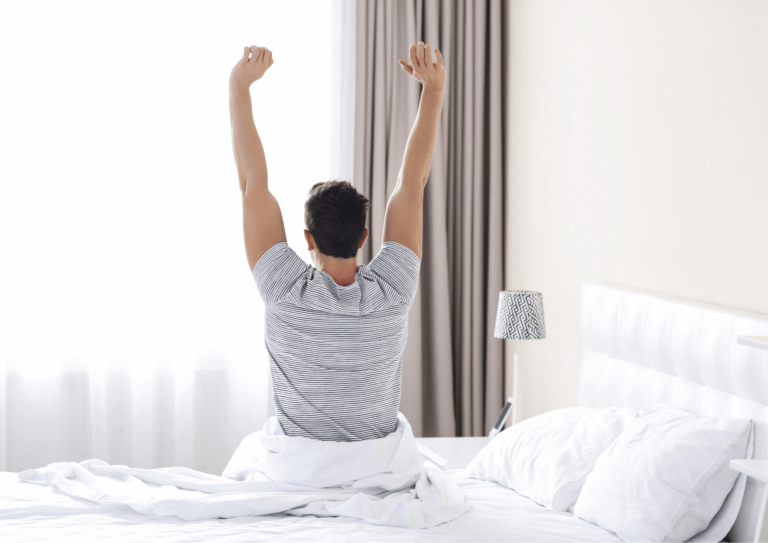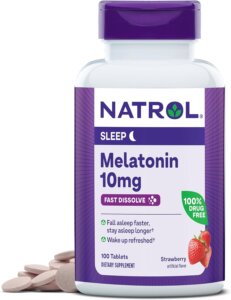This website uses affiliate links which may earn a commission at no additional cost to you.
As an Amazon Associate we earn from qualifying purchases.
Contents
In the quest to become stronger and faster on the bike, cyclists often overlook a powerful ally: sleep. Whether you’re a weekend warrior or a dedicated cycling enthusiast, the quality of your sleep profoundly impacts your on-road performance.
Do you truly understand the importance of sleep in maximizing your cycling potential? We’ll explore the science behind it and provide straightforward steps to enhance your sleep for better cycling results.
The Science of Sleep: Your Body’s Reboot Button
Think of sleep as your body’s ultimate reset button. When you lay down to rest, your body isn’t just switching off – it’s shifting into high gear to repair, rejuvenate, and recharge. Every night, you embark on a journey through different sleep stages, each with a unique role in keeping you at your best.
As you drift off, you enter light sleep, the initial stage where your body begins to relax and slow down. From there, you move into deeper sleep, a critical phase for physical repair.
It’s during deep sleep that your body releases growth hormone, the superhero of your body’s repair crew. This hormone plays a crucial role in repairing muscles, strengthening bones, and even boosting your immune system.
And let’s not forget REM sleep, the stage where dreams unfold. During REM sleep, your brain is hard at work, processing memories, and enhancing your cognitive abilities. It’s like giving your brain a well-deserved spa day, where it scrubs away the clutter and ensures you wake up mentally refreshed.
All these stages are orchestrated by your body’s internal clock, the circadian rhythm. This internal timekeeper regulates when you feel sleepy and when you’re most alert.
So, the next time you’re cozy under the covers, know that your body is busy doing some serious maintenance work, getting you ready for the challenges and triumphs of the day ahead.
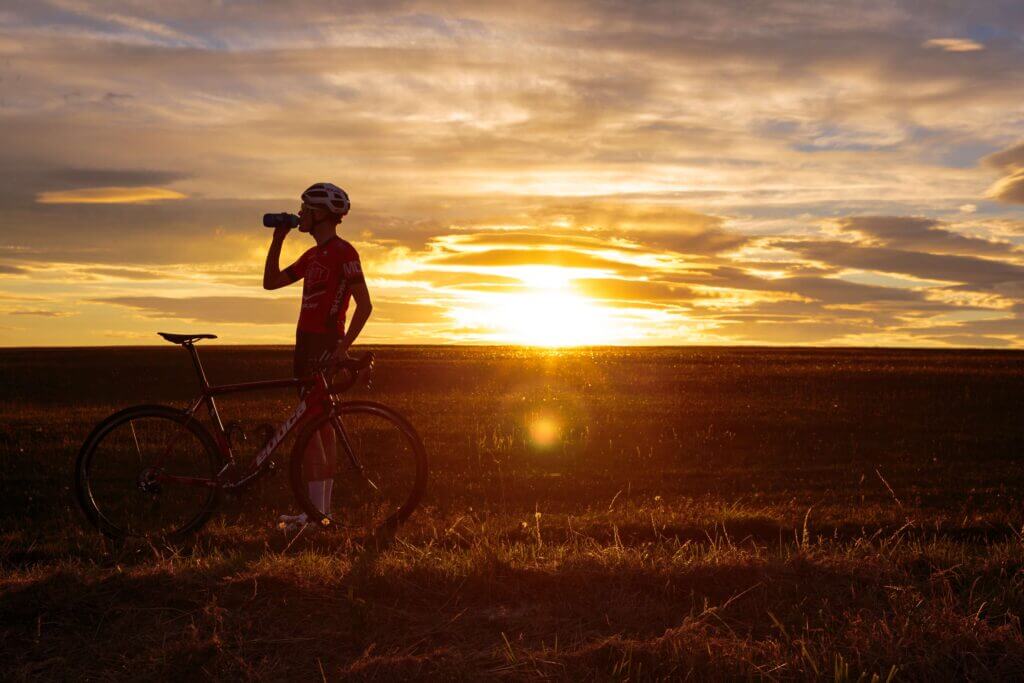
Sleep and Athletic Performance: The Crucial Link
Picture this: you’re all set to hit the road, but your muscles still ache from your last ride because you didn’t sleep well the night before. It’s as if you’re pedaling against a relentless headwind, draining your energy and leaving you feeling frustrated. This scenario highlights the profound impact of sleep on your athletic performance.
Scientific research has left no room for doubt – the quality of your sleep directly influences how well you perform in your cycling endeavors. Sleep isn’t just a luxury; it’s a non-negotiable component of reaching your peak on the road. When you’re well-rested, your body is like a well-tuned machine, ready to conquer those miles with efficiency and gusto.
But when sleep is lacking, it’s like forgetting to fill your tires before a ride – your performance takes a hit. Endurance, a key factor in cycling success, suffers under the weight of sleep deprivation.
Your ability to keep going, to push through those tough segments, can dwindle. Reaction times also take a hit, putting you at risk on the road. And let’s not forget recovery – a cornerstone of athletic progress.
Without sufficient sleep, your body struggles to repair itself, leaving you more susceptible to fatigue and injuries.
In the world of cycling, balance is everything. You push your limits during rides, but that effort needs to be balanced with effective recovery.
Sleep provides the essential equilibrium that your body craves. It’s the restoration phase that rejuvenates your muscles, refreshes your mind, and renews your energy reserves.
Without adequate sleep, you’re essentially robbing yourself of the full benefits of your training and putting a ceiling on your performance potential.
So, before you saddle up for your next adventure, remember that sleep isn’t just an afterthought – it’s a vital ingredient for cycling success. Prioritizing sleep isn’t a luxury; it’s a strategic move that can propel you toward reaching your cycling goals. By giving your body the sleep it needs, you’re setting the stage for a smoother, more satisfying ride.
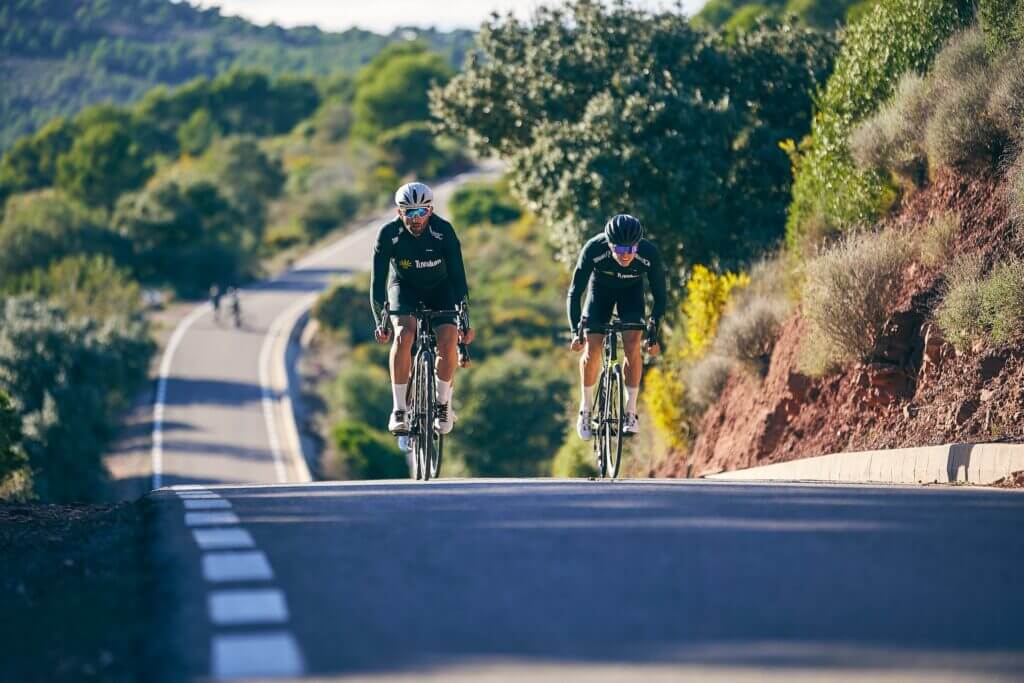
Muscle Recovery and Growth: Your Body’s Repair Shop
Picture this: after a demanding ride, your muscles are like well-used tools that need a little TLC. They’ve put in the effort, and now they’re ready for some care. This is where sleep steps in – it’s like sending your muscles to a repair shop.
When you sleep, your body gets to work. Deep sleep is the prime time for repairs. Think of it as the stage where your body’s maintenance crew goes to action. This is when growth hormone is released – your body’s natural repair mechanism. Just like a mechanic fine-tunes a car, growth hormone fine-tunes your muscles.
This hormone is a game-changer. It doesn’t just help your muscles recover from the micro-tears that happen during cycling; it also stimulates growth. It’s as if your body is upgrading your muscles, making them stronger and more prepared for your next adventure on the road.
And here’s the cool part: you don’t have to do anything extra for this process to happen. All you need to do is get a good night’s sleep. So, as you slip into dreamland, know that your body is working its magic, getting your muscles ready to conquer that next ascent or sprint.
When you prioritize sleep, you’re not just catching some Zs – you’re giving your body the tools it needs to build a stronger, more capable you. So, the next time you’re tempted to stay up late, think about your muscles and how much they’ll appreciate the extra sleep-induced TLC.
Enhancing Mental Resilience: The Cognitive Benefits of Sleep
Cycling isn’t merely a test of physical endurance; it’s a mental challenge as well. Navigating roads, making swift decisions, and maintaining laser-like focus are all integral to your performance.
Sleep isn’t just about rejuvenating your body; it’s a vital tool for your mind as well. When you sleep, your brain engages in several crucial processes that directly impact your cycling experience.
Here’s how the power of sleep can give your mind the edge it needs:
1. Sustained Motivation: A well-rested mind is more resilient. It helps you stay motivated to push through those grueling training rides and tackle new challenges. When you’re tired, motivation often wanes, making it harder to summon the enthusiasm needed to succeed.
2. Mental Fortitude for Training Rides: Sleep acts as a shield for your mental resilience. It equips you to tackle demanding training rides with greater determination and focus. When you’re well-rested, you’re less likely to become mentally fatigued, allowing you to extract the most from each session.
3. Informed Nutritional Choices: Quality sleep enhances your decision-making skills, even in the realm of nutrition. Well-rested individuals tend to make healthier food choices, providing their bodies with the fuel needed for optimal performance. This means you’re less likely to reach for less nutritious options that could hinder your progress.
4. Emotional Balance: Sleep plays a crucial role in managing emotions. When you’re well-rested, you’re better equipped to keep your emotions in check, ensuring that stress, frustration, or anxiety don’t derail your training or performance on the road.
Sleep rejuvenates your motivation, enhances your mental resilience, and guides you toward wise decisions – all essential components of a successful cycling journey. So, prioritize sleep not only for the physical benefits but also to empower your mind for the road ahead.

Preventing Roadblocks: Sleep and Injury Prevention
Injury prevention is a top priority for cyclists and athletes alike. Nobody wants to put their cycling journey on hold due to an injury. While factors like proper gear and training are essential, there’s another critical player in this game – sleep. Think of it as your body’s personal bodyguard against injuries.
When you sleep, your body goes into repair mode. It’s like sending in a team of experts to fix and strengthen your muscles and joints. This repair process is vital for keeping you resilient and ready for your next ride.
But here’s the twist: when you skimp on sleep, it’s like taking away your bodyguard’s protective shield.
Research has shown a clear link between sleep deprivation and an increased risk of sports injuries. It makes sense when you think about it.
Sleep deprivation doesn’t just leave you feeling tired; it impairs your motor skills and cognitive functions – both of which are crucial for athletic performance and injury avoidance.
On the flip side, prioritizing sleep can be your secret weapon for injury prevention. Imagine getting a solid night’s sleep – it’s like fortifying your body’s defenses. Your muscles and joints become more robust, less prone to injury, and better at healing if a mishap does occur.
In fact, there’s evidence that sleep extension, meaning getting more than the usual 6-7 hours, can enhance athletic performance and decrease the risk of injuries.
Some studies suggest that athletes who consistently get 10 or more hours of sleep per night experience improvements in their sports performance. That’s like giving your body an extra boost before each ride.
So, if you’re serious about injury prevention and want to keep your cycling journey on a smooth, uninterrupted path, don’t underestimate the power of sleep.
It’s not just about feeling rested – it’s about building a strong and resilient body that can handle whatever the road throws your way.
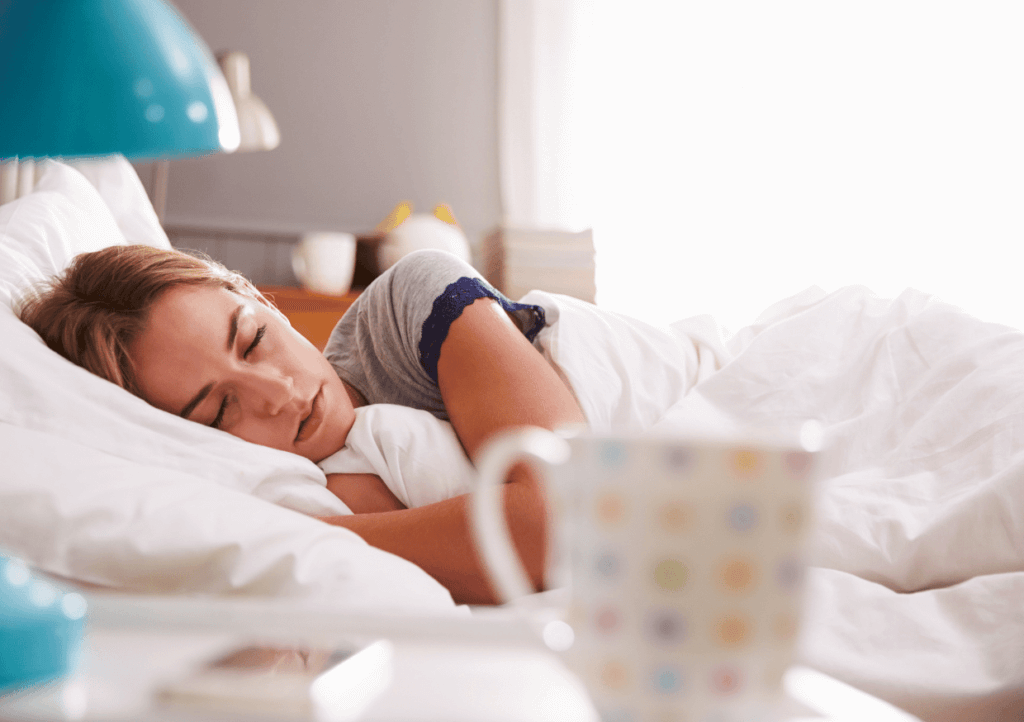
Easy Steps for Better Sleep: Your Sleep Toolbox
Getting better sleep doesn’t require a Ph.D. in sleep science. Small, simple changes can make a world of difference in how well you rest, and in turn, how well you ride. Here’s your sleep toolbox:
1. Create a Cozy Sleep Space: Your bedroom should be your sleep sanctuary. Make it cool, dark, and comfortable. This cozy environment sends a signal to your body that it’s time to wind down.
Consider investing in blackout curtains to keep the light out and adjusting the thermostat to a comfortable temperature for sleep.
2. Stick to a Sleep Schedule: Our bodies love routines, and your sleep is no exception. Try to go to bed and wake up at the same times every day, even on weekends.
This consistency helps regulate your internal body clock. Over time, your body will naturally start feeling sleepy and waking up at the right times.
3. Wind Down Before Bed: Your body needs a little transition time before sleep. Engage in calming activities that signal to your body it’s time to chill out. Reading a book, taking a warm bath, practicing gentle stretches, and wearing blue light-blocking glasses if you’re looking at screens are excellent options.
Avoid stimulating activities like scrolling through your phone or watching intense TV shows right before bedtime, as they can make it harder to fall asleep.
4. Limit Caffeine and Heavy Meals Before Bed: Coffee and big, heavy meals too close to bedtime can be sleep disruptors. Caffeine is a stimulant that can keep you awake, so it’s best to avoid it in the hours leading up to bedtime.
Big meals can lead to discomfort and indigestion, making it harder to fall asleep peacefully. Try to finish your last meal at least a few hours before hitting the hay.
5. Mind Your Liquid Intake: Hydration is essential, but try to balance it. Avoid drinking too many liquids close to bedtime to minimize waking up in the middle of the night for bathroom trips.
Dehydration can be disruptive, but so can frequent bathroom visits when you should be snoozing. Also, avoid excessive alcohol on a regular basis, as it can interfere with the quality of your sleep.
6. Consider Sleep Supplements (With Caution): If you find yourself struggling to fall asleep despite your best efforts, you might consider natural sleep supplements. However, it’s essential to use them sensibly and with caution. Prescription sleeping pills often come with side effects and can lead to poor sleep quality in the long run.
Melatonin, a popular sleep aid, should also be used sparingly, as many supplements contain significantly higher doses (10 to 1000 times more) than what our bodies naturally produce.
Instead, you can explore natural ‘sleep cocktail’ supplements recommended by Dr. Andrew Huberman, a neuroscientist at Stanford School of Medicine:
– Magnesium Threonate (300–400 mg) or Magnesium Bisglycinate (200 mg) daily
– Apigenin (50 mg) daily
– Theanine (100–400 mg) daily
These supplements can help you fall asleep faster and enjoy a deeper, more restful slumber. To experience similar sleep improvements, consider taking this “sleep cocktail” 30–60 minutes before bedtime.
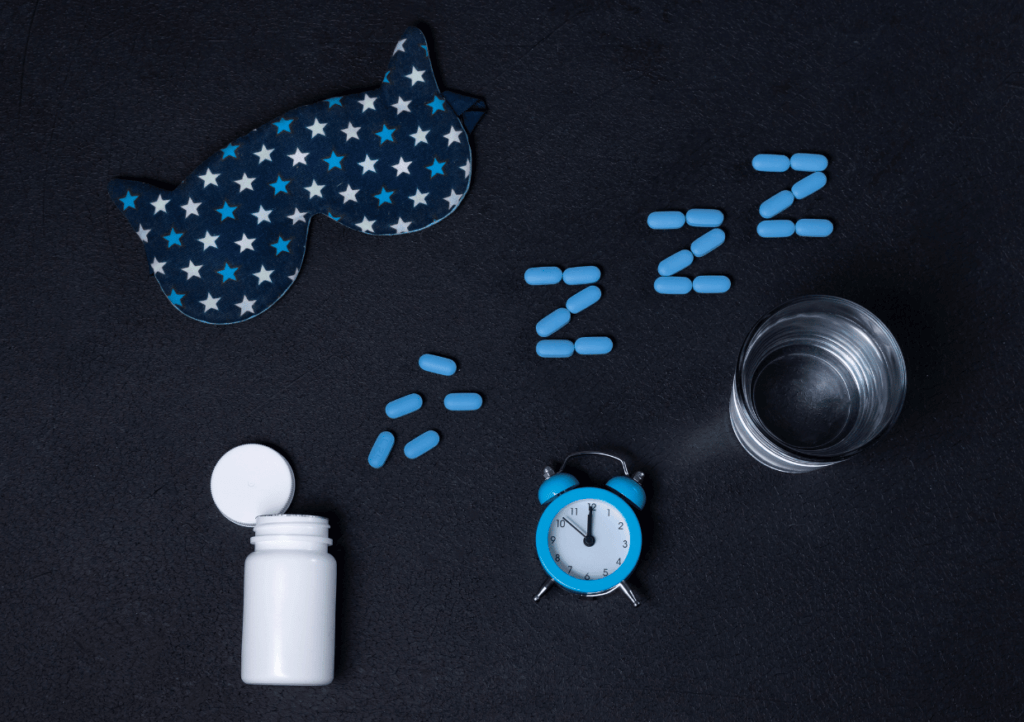
Balancing Act: Sleep and Training
Cycling training can be physically demanding and time consuming, and it often feels like there simply aren’t enough hours in the day to fit everything in. You’re juggling work, family, and other responsibilities alongside your passion for cycling.
In this hectic schedule, sleep can sometimes appear as a negotiable commodity – something you can trim down to make more room for training. However, that’s not the way to maximize your cycling potential.
Sleep is, in fact, a secret weapon that can elevate your training and performance. Here’s why it’s essential to strike the right balance:
Now, let’s talk about finding that balance. It’s like finding the right gear on your bike – it might take some adjustments, but it’s essential for a smooth ride. Here are some tips on how to strike that balance between getting enough sleep, managing your training, and handling work and family commitments:
1. Prioritize Sleep: Treat sleep as a non-negotiable part of your training plan. Just like you wouldn’t skip a workout, don’t skip on sleep. Make it a priority in your daily schedule. Have a consistent bedtime every night.
2. Plan Your Training: Be strategic about your training sessions. Opt for quality over quantity. Short, focused workouts can often yield better results than long, exhausting ones. This leaves you with more time for rest.
3. Time Management: Efficient time management is key. Plan your day, including work, family time, training, and even lunch, to ensure there’s room for a good night’s sleep.
Consider early morning or evening workouts to free up your daytime hours. By factoring in lunch, you can ensure you have adequate breaks and refueling time, making your day more balanced and sustainable.
4. Rest Days: Include dedicated rest days in your training plan. These are days when you prioritize recovery and let your body heal. Use them to catch up on sleep and recharge.
5. Communicate: Let your family and loved ones know about your training goals and the importance of sleep. Clear communication can help them understand why you need this time and support you in finding the balance.
6. Adaptability: Be flexible. Life is unpredictable, and sometimes, you may need to adjust your training schedule to accommodate unexpected events. Don’t stress about it; adapt and keep moving forward.
Remember, finding the balance between sleep, training, work, and family is a journey. It may take some trial and error, but it’s achievable. When you prioritize sleep and manage your time effectively, you’ll find that you have the energy, focus, and strength to excel in your cycling endeavors while also meeting your other life commitments.

